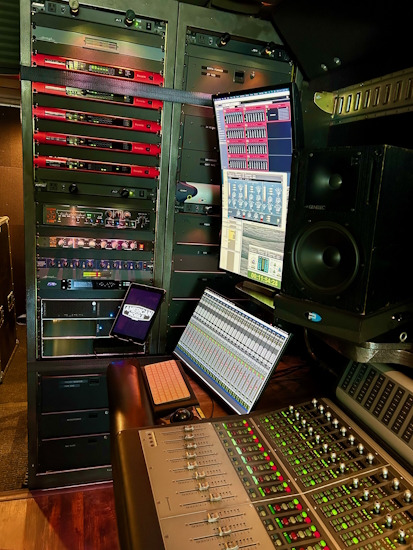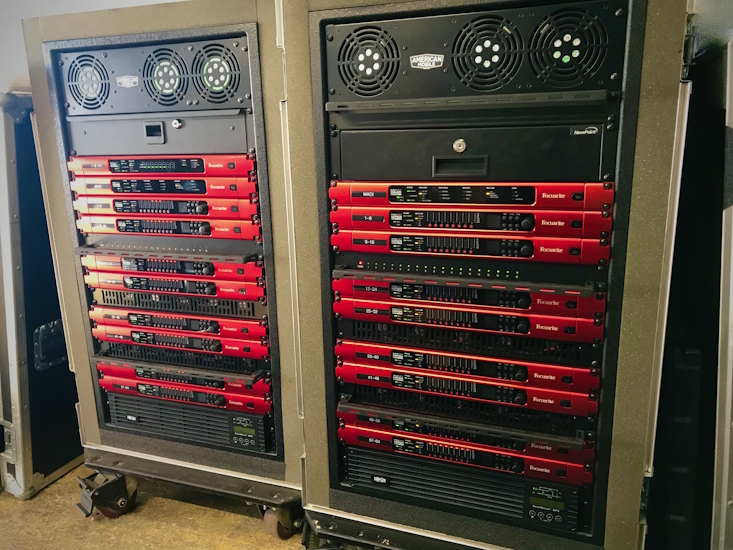American Mobile relies on Focusrite Technology

Chicago-based firm American Mobile (AM) has been the provider of real-time audio mixes for the live-streams of major music festivals including Coachella, Stagecoach, Farm Aid, Outside Lands and Lollapalooza for nearly 20 years, and Focusrite components have become an absolutely essential part of their gear setup in recent years. The firm was started by Owner and Chief Engineer Chris Shepard as the audio-mix provider for Springboard Productions, which produces and transmits the live-stream webcasts for those and other music festivals. Shepard and Springboard founder Hank Neuberger met while working at the Chicago Recording Company, the city’s legendary recording complex, in the late 1980s. “The streaming aspect of these festivals have become huge,” says Shepard. “In 2018 we had 650,000 people watching Beyoncé on the stream at Coachella; this year, we had 1.4 million listening to Black Pink there, by far the largest online audience ever. There are so many stages, and the performances – our team mixed about 40 bands and about 450 songs each day of the festival – have become much more complicated and complex, in terms of I/O and other technical aspects. Adding Focusrite technology to our production workflow has made a huge and very positive difference.”
American Mobile deployed two types of racks for Coachella and other festivals this year. On stage (and at Coachella there were four of them that AM did the live-stream mixing for: Main, Outdoor, Mojave, and Gobi) there were eight Focusrite RedNet MP8R eight-channel mic pre and A/D converters and two RedNet D64R 64-channel MADI bridges. These connected, via a Dante infrastructure, to a control room for each stage fitted with a rack containing three RedNet HD32R 32-channel HD Dante network bridges and an RedNet A16R 16-channel analogue I/O interface.

“From the stage, we were able to handle 128 channels of audio, which is essential, considering how many tracks and instruments and vocals you might have to deal with, depending upon the artist and the performance,” Shepard explains. “And the D64R allows us to down-convert from 96 to 48 kHz, which really helps fit all of that information into the audio stream. Considering that the stream is going to be compressed, 48k is plenty – a higher resolution than a CD – but it’s one more process we don’t have to think about because the Focusrite device takes care of it.” In the control rooms, two HD32R interfaces - the third is a redundant back-up or used if more than 96 channels are needed — bring the stage signal to the mixer. The A16R, Shepard says, offers the perfect interface for ingesting any analog audio elements into the mix and for sending the feed to the video control room.
“Something crucial that the Focusrite devices share is really great user support,” he adds. “On the phone or online, we never have to worry about support, and if there’s a particularly challenging issue, we can do a screen share and get it resolved. That’s been especially important this year as I’ve moved on from mixing myself to supervising all of the stages. We also get software updates three or four times a year that assure we stay current with any OS updates from Apple or software updates from Dante. Dante is our backbone now, and Focusrite has us covered for that. All that makes a huge difference for our mixers on each stage.”
Among those is Ryan Staples, who mixed the livestream audio for artists including Blink 182, Björk, and Rosalía on the Main Stage for American Mobile, joined by A1s Steve Weeder on the Outdoor Stage, Jayson Homyak at the Mojave Stage, and Alex Burns on the Gobi Stage. “Moving to MADI and Dante have made all the difference in the workflow – night and day,” says Staples, who also mixed the livestream at the Stagecoach festival. “Before, we were using analog splits, but now, with fiber, we can accommodate things like a band coming on and wanting their monitors on the other side of the stage – just pull it out and reconnect it using the D64R MADI box. We can also build templates for each band, so when a set changeover happens, we’re ready with all the updated parameters. That kind of flexibility is what the Focusrite gear is great for.” And, he adds, the Focusrite technology has a positive impact on the system’s sonic quality. “The mic pre’s on the MP8R sound fantastic – studio quality – and being able to control them remotely really helps our workflow efficiency.”
Steve Weeder, who mixed the Outdoor Stage at Coachella for American Mobile’s livestream, underscored his colleague’s comments when he recalled the experience with one particular high-profile artist there. “The first weekend we had an analog split from the stage, but their second performance the next weekend used MADI,” he says. “The output list they had given me the week before was completely changed, and it was changed again – a total of three times! They had a number of cross patches in the console. That’s how your day starts with festivals: even if you’ve already talked it through ahead of time, something always changes. The thing about having Focusrite in the signal chain is that we’re ready for that. We’re ready for anything.” That’s a sentiment he also extended to the D64R’s real-time sample-rate conversion capability. “It works like a champ,” he says. “Blows me away me every time. I love that we can do that.”
American Mobile has standardized its systems with Focusrite’s RedNet as its signal-transport backbone, a complement that also includes a number of RedNet AM2 stereo audio monitoring units. The result has been a rock-solid signal path with utterly flexible I/O control. “We have a great team of talented mixers, and Focusrite gear has made them even more efficient and effective,” says Shepard. “In remote mixing and recording, we have to interface with a variety of production input requirements. Having RedNet on board makes sure we can accommodate any of them.”
 How to resolve AdBlock issue?
How to resolve AdBlock issue?